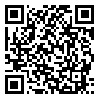BibTeX | RIS | EndNote | Medlars | ProCite | Reference Manager | RefWorks
Send citation to:
URL: http://umj.umsu.ac.ir/article-1-983-en.html

 , Firouz Ghaderi Pakdel *
, Firouz Ghaderi Pakdel * 
 , Zahir Mohammad Hasan
, Zahir Mohammad Hasan 
 , Samad Zare
, Samad Zare 
 , Amir Tokmechi
, Amir Tokmechi 
 , Rahim Hobbenaghi
, Rahim Hobbenaghi 
 , Somaye Naderi
, Somaye Naderi 

Background & Aims: Breast cancer is one of major invasive women cancers. Probiotics are nonpathogenic micro-organisms that have immuno-stimulatory effects. Probiotics can stimulate the systemic immunity beside gut immunity against cancer. This study aimed to evaluate the effects of lactobacillus rhamnosus LMG18243 on breast cancer development in inbred Balb/C mice.
Materials & Methods: Ten Balb/C mice (4-6 weeks age, 18-20 gr) were entered to study and divided to control and probiotic groups after tumor verification. The probiotic group received bacteria (3 ´ 108 CFU/day) one week before tumorization by gastric intubation. The probiotic administration continued additional 27 days with 3 days interval, and 7 days postoperative delay. The control group received PBS as the same protocol and schedule.
Results: The data showed that the tumor growth in probiotic group was lower than the control group significantly. The histopathologic data showed that the mitotic cells in tumor decreased and necrosis processes increased significantly in probiotic group. The significant increase in DTH of probiotic group indicated that the cell mediated immune system was stimulated in probiotic group.
Conclusion: The lactobacillus rhamnosus as a probiotic can potentiate the immune system against tumor and can be used as a good adjuvant in cancer therapy. It can stimulate Th1 immune memory cells.
Source: Urmia Med J 2011: 22(3): 274 ISSN: 1027-3727
| Rights and permissions | |
 |
This work is licensed under a Creative Commons Attribution-NonCommercial 4.0 International License. |



